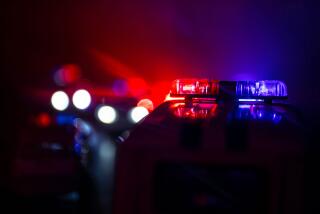311 May Solve L.A.’s 911 Problems
A small, overcrowded office suite four floors beneath City Hall is the nerve center of the Los Angeles 911 emergency telephone system, where a highly professional but understaffed team of dispatchers struggles to answer more than 2 million calls per year, most of which do not concern genuine emergencies.
The high volume of nonemergency calls (an estimated 80%) and a shortage of dispatchers creates the potential every day that those in true distress won’t get through until it’s too late.
Fixing the dispatch center’s chronic staffing problems is essential, but we also must explore ways to divert nonemergency calls from 911. The most promising solution is a 311 system, which President Clinton has advocated as a national standard and which other large cities are experimenting with. The idea is simple: Give people a single, easily remembered three-digit nonemergency number that can be dialed from anywhere in the city, and they’ll be far less likely to misuse 911.
Today, most 911 calls in Los Angeles are picked up within 10 seconds. But a significant percentage take longer. On a hot Friday evening with school in recess, a caller to 911 might be on hold for half a minute or more. Those extra moments are an excruciating wait in a real emergency, and they can mean the difference between life and death.
Our dispatch center is reducing answer times and also the percentage of calls that disconnect before reaching a dispatcher, --down from more than 8% last year to 5% so far this year. But we can do better. Chicago answers its 911 calls in an average of two seconds, as does Baltimore. San Jose answers in slightly over three seconds.
Solving the 911 problem and simplifying nonemergency access go hand-in-hand. Already, Baltimore, Dallas and San Jose have turned to 311 systems, with positive results. Baltimore reported a nearly 25% reduction in 911 calls and a 66% reduction in average 911 answer time. It also significantly reduced nonemergency police dispatches, possibly the result of operators (in Baltimore, sworn officers) having more time and expertise to resolve situations on the phone. San Jose reports an 11% reduction in 911 calls and a 16% decrease in 911 answer time. Dallas, which I just visited with city communication experts, reports a 10% reduction in 911 calls and a nearly 50% decrease in answer time.
Regardless of 311, Los Angeles needs another 160 dispatchers to staff our center adequately. The money is there. But we must address what has been a staggering 50% first-year attrition rate due to stress, oppressive working conditions and inadequate selection criteria. During the recent budget process, the council approved more than $400,000 for the LAPD to craft interim solutions to the 911 problem. I then asked for a report, now being prepared, on how to cut dispatcher attrition.
The LAPD recently installed new software to gather data about the nature of nonemergency calls over our 911 lines. How many calls concern public safety issues? For what other reasons do people call? How many information and service requests could be handled by a general city operator or referred automatically to another department, such as Building and Safety or Recreation and Parks?
The answers will help us decide whether 311 makes sense for Los Angeles and if so, whether it should be the main access number for general city services or only the way to reach the police and fire departments in situations that are not life-threatening. Another possibility is a proposal by my colleague, Councilmember Laura Chick, for a single toll-free number to access city services. Together with Councilmember Mark Ridley-Thomas, Chick and I recently were appointed to oversee the analysis of these and other information access projects.
Los Angeles has always lived on the frontier of technology, and our police and fire departments are among the world’s best. It makes no sense to expect less from our emergency communication system. I believe improving that system will include implementing 311. But whatever the ultimate design, residents must have direct and immediate telephone access to emergency services.
More to Read
Sign up for Essential California
The most important California stories and recommendations in your inbox every morning.
You may occasionally receive promotional content from the Los Angeles Times.









